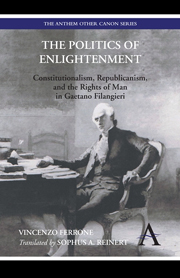 The Politics of Enlightenment
The Politics of Enlightenment from Part One - The New Politics ‘Ex Parte Civium’
Published online by Cambridge University Press: 05 February 2013
What I call virtue in a republic is love of the homeland, that is, love of equality. It is not a moral virtue or a Christian virtue; it is political virtue, and this is the spring that makes republican government move… It is in republican government that the full power of education is needed.
Montesquieu, L'esprit des lois (1748)Any state which is ruled by law I call a ‘republic,’ whatever the form of its constitution; for then, and then alone, does the public interest govern and then alone is the ‘public thing’ – the res publica – a reality. All legitimate government is ‘republican’…
Rousseau, Contrat social (1762)Does one have a fatherland where only one wants, and all obey?
Alfieri, Virginia, a. III, sc. IIWhat did it mean to be a republican thinker in the eighteenth century?
Our knowledge of the developments of the republican tradition in the political history of the Enlightenment has not made great advances in recent decades. Paradoxically, the recent explosion of interest in these issues among philosophers and historians of political thought has probably not furthered our understanding of them, for they have ended up privileging a sort of imagined republicanism, divorced from its context, made up of arbitrary metahistorical reconstructions, the paradigmatic nature of which systematically gives ample concessions to anachronism: the true mortal sin of the professional historian.
To save this book to your Kindle, first ensure [email protected] is added to your Approved Personal Document E-mail List under your Personal Document Settings on the Manage Your Content and Devices page of your Amazon account. Then enter the ‘name’ part of your Kindle email address below. Find out more about saving to your Kindle.
Note you can select to save to either the @free.kindle.com or @kindle.com variations. ‘@free.kindle.com’ emails are free but can only be saved to your device when it is connected to wi-fi. ‘@kindle.com’ emails can be delivered even when you are not connected to wi-fi, but note that service fees apply.
Find out more about the Kindle Personal Document Service.
To save content items to your account, please confirm that you agree to abide by our usage policies. If this is the first time you use this feature, you will be asked to authorise Cambridge Core to connect with your account. Find out more about saving content to Dropbox.
To save content items to your account, please confirm that you agree to abide by our usage policies. If this is the first time you use this feature, you will be asked to authorise Cambridge Core to connect with your account. Find out more about saving content to Google Drive.